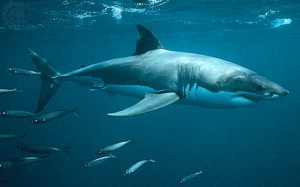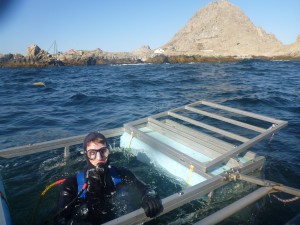by
Casper Daugaard
Let me tell you a story.
It’s 7:30 am in the morning, 27 miles off the coast of San Francisco. To my right is a huge rock formation known as the Farallon Islands. In all other directions, ocean. The iron cage is bobbing about happily in the waves and is a bitch to get my legs into. To make matters worse, the water is ice cold as it permeates my wet suit. I put the hookah air supply in my mouth and, before I know it, get pushed from behind by the evil dive master and plump into the water. As I adjust to the cold water and the awkward layout of the cage, I look around through the offensively limited field of vision in my diving mask. The water is green-grey and murky, with a modest 9ft visibility to add to the horror of the situation. I know there is something out there. Everything’s really awful. I want to rip my mask off, get out of here. I’m frightened!
I am supposed to be joined in the cage by Erin, a friendly doctor’s wife from Orlando, FL. On the ride out this morning, Erin told me this expedition was on her bucket list. She never makes it into the cage, and I am all alone. What I don’t know is that, onboard the boat, Erin is suffering from a mild panic attack and refusing to get in the water. Reason: Erin has just witnessed ‘Mathilda’ breach the surface and attack one of the seal-shaped rubber decoys. Mathilda is an 18 foot Carcharodon carcharias. A great white shark. One of the most deadly and terrifying predators on the planet. Mathilda’s species has not had to evolve for 200 million years. I’m about to meet her, too.
I have been afraid of sharks since I was little. Not just wary, as any rational person. But batshit phobic. It’s quite awful. However, after reading an inspirational book about the rapper and businessman 50 Cent, I felt a burning urge to confront this worst fear of mine and see what would happen.
 So there I am, alone in the cold cage. I feel Mathilda before I see her, as she bangs into the cage from behind, investigating it. I turn, horrified and with a racing heartbeat, and see her large body swimming calmly away into the murkiness. After about 30 seconds she returns. I expect to panic but, strangely, don’t. There is something odd about how calm she is. She is clearly curious about the cage, swimming back and forth. It’s almost… cute. A few hours later, I’ve also met Mathilda’s hunting buddy, Junior and her 21” boyfriend Tom Jones under similar circumstances. Their ‘attitude’ is similar to hers, and none of them attempt to destroy the cage and kill me. I’ve realized it’s all ok. Great white sharks are adorable and friendly. How riveting! A month later, I went to Thailand where I also went SCUBA diving and discovered something that filled me with glee: my fear of sharks had completely vanished. As though it had never existed at all. True story.
So there I am, alone in the cold cage. I feel Mathilda before I see her, as she bangs into the cage from behind, investigating it. I turn, horrified and with a racing heartbeat, and see her large body swimming calmly away into the murkiness. After about 30 seconds she returns. I expect to panic but, strangely, don’t. There is something odd about how calm she is. She is clearly curious about the cage, swimming back and forth. It’s almost… cute. A few hours later, I’ve also met Mathilda’s hunting buddy, Junior and her 21” boyfriend Tom Jones under similar circumstances. Their ‘attitude’ is similar to hers, and none of them attempt to destroy the cage and kill me. I’ve realized it’s all ok. Great white sharks are adorable and friendly. How riveting! A month later, I went to Thailand where I also went SCUBA diving and discovered something that filled me with glee: my fear of sharks had completely vanished. As though it had never existed at all. True story.
F.E.A.R
I feel the trip I took to San Francisco was an important one. Why?
I am, amongst other things, a college student. Perhaps you are, too. College is not just the place to obsess over the overwhelming difference between 3.66 and 3.69, ponder your complicated sexual identity, lose your accent (and soul), get catastrophically wasted and arrested for the first time.
No, these hallowed halls of academia also provide a great laboratory to experiment with tactics to become more fearless. See, college is a risk-free environment. Or at least more risk-free that any environment you will experience in the future. So what does that mean?
My friend Max (a successful student entrepreneur) says you shouldn’t learn things in college you can learn on the internet. Acclaimed professor and grand strategist John Gaddis encourages his students to pursue “a life of danger” (!) while at university. Venture capitalist and thought leader Paul Graham (who some expect to become one of the richest men in the country within a decade) claims that in college, for the only time in your life, you can fail without risk. Graham doesn’t mean academically (low grades have some annoying career risks) but in awesome pursuits you undertake outside the classroom. The things that can make you stand out.
In college, you don’t have a mortgage or children to feed. With supportive parents or financial aid, you have no or little income to sustain when compared to the “real life” looming in the distance. The occasion is perfect to do exciting things such as founding a business, learning a new skill like programming, knitting or squash, or reaching out and making friends with celebrity professors/alumni. Or save up to travel across the country and dive with great white sharks in cold, murky waters. Yet, few people do such things. “But I can’t do that,” they say.
There is a reason for this reluctance to do “crazy shit”: The risk-free college environment, while important, simply is not enough. This is important: Succeeding at anything “out of the ordinary” while enrolled in college usually involves confronting and managing different types of fears. Fear of failure, awkwardness, missing out, death, standing out and being judged, snakes/heights/people… there are plenty to choose from. The lack of confidence caused by these deeply rooted fears lowers confidence even further. The situation becomes grim.
TYPES OF FEAR
Most of people are timid and conservative. There are excellent reasons for this. We all live within a prison of fears that confines us within a limited range of action. This used to be a useful and desirable thing. When our ancestors stalked around in the jungle, the emotion of fear protected them from predators and other dangers. But as the world has changed and we have gained more control over the environment, something strange has happened. Our fears are no longer that useful. They are irrational, and often hold us back from doing what we need or want to do.
There are plenty of fears we struggle with. Here are the fears that most prevent us college students from “swimming with the sharks”.
 1. Fear of Focus. When great college students have succeeded at something spectacular, like writing an award-winning screenplay or creating a social network with 500 million users and billions of dollars in revenue, it usually indicates they were talented, driven individuals. But also, almost without exception, they focused on just that. Their project was the singular object of their intension and efforts.
1. Fear of Focus. When great college students have succeeded at something spectacular, like writing an award-winning screenplay or creating a social network with 500 million users and billions of dollars in revenue, it usually indicates they were talented, driven individuals. But also, almost without exception, they focused on just that. Their project was the singular object of their intension and efforts.
The problem is that young and intelligent people tend to have a wide variety of interests. They want to do many different things at once, often because out of fear on missing out on valuable opportunities (FOMO) if they stick with only one thing.
However, intensity over extensity is almost a rule of physics. Painful sacrifices are often necessary to shed the fear of focus. Planning a dangerous expedition, founding and running an organization or business venture, or reaching out and connecting to powerful celebrities all require high amounts of thinking and hard work. And they require focus which you cannot afford to dilute.
That is all well and good, you might say. Even if I can sacrifice everything and focus all efforts, what if I fail?
2. Fear of Failure. I’m almost at a loss on how to explain this without sounding like a cliché. But take the oft-debated example of starting a business while in college. If you succeed and start making money, most people will likely consider it impressive and unusual. You will certainly “stand out”, as this article advocates. But while starting a business is a lot of fun, it is also very difficult. Statistics say you will fail. And the prospect of failure can generate much fear and trembling. Why is that?
First of all, starting a business might require you to invest some money. You may lose this money. That’s how capitalism works: it only rewards risk. If you aren’t financially and mentally prepared to lose your risk capital, don’t invest it. Perhaps think of a less costly idea.
You may also be afraid of having wasted your valuable time if your business or project fails. This is downright false, a lie. Even in the case of failure, your time invested has likely yielded invaluable experience and lessons learned. You will have made mistakes that you can document, think deeply about and vow never to repeat again. Not a bad return, eh?
Abraham Lincoln lost several elections before he finally made it into Congress and became one of the greatest Americans to have ever lived. Steve Jobs was fired from Apple for 11 years before he returned and added $380 billion to the company’s market capitalization. “Failing” is learning. Don’t fear it.
Even if you have gathered useful contacts and experience, won’t your friends and other people judge you if you fail? Won’t they laugh cruelly behind your back, their hearts filled with gall and schadenfreude?
3. Fear of Judgement (not being liked). Let’s not kid ourselves: we care a lot about what others think of us, especially in a small community like college where you run into the same people over and over. One of our most debilitating fears is to be judged or downright disliked by these cool and important people.
I think about that a lot personally, even after experimenting with fearlessness and non-flinching. Some of my actions, including writing on this blog, spout reactions such as being called “arrogant” and a “self-promoting douchebag”. I have felt extremely insecure and self-conscious about it. But I try to ignore that and act anyway, lest I be a hypocrite. And if anyone has a problem with that, I will encourage them to jump into the nearest body of water (or, even better, near the Farallon Islands).
It is no wonder this likeability fear is part of our instincts. Our ancestors in the jungle depended on maximum approval from the rest of their tribe (community) to ensure physical security and access to scarce resources like food. They could not risk standing out and potentially being shunned for their lack of conformity. But the world is different now.
This is best illustrated by a couple examples. As a teenager, former Governor of California Arnold Schwarzenegger took up bodybuilding. His peers at school soon started judging, seeing him as weird and narcissistic. This caused Arnold to feel insecure. He realized there was only one thing he could do. When he sensed someone was whispering about him or didn’t like him, he would face them directly, grin with a huge smile and flex his enormous bicep toward them so his sleeve almost ripped.
The admiration and awe that such impish audacity inspires eventually weaned off Arnold’s insecurities and gave him. “Unbelievable! What an arrogant douchebag!” we may think. But we can’t help but admire and envy him a little bit.
Steve Jobs (of Apple fame) was shy and self-effacing as a young man, but he transformed himself into a charismatic and even tyrannical leader and built the most valuable company in the history of the world. His secret was to stop caring what people thought of him. Most people stress and obsess over conforming and being liked by everyone all the time. Steve said that kind of thinking is actually vanity, a negative and destructive trait that can hold paralyze you and hold you back from what you want or need to do.
A
SO WHAT TO DO?
Granted, Jobs and Schwarzenegger are rather unusual and intense people. But they both make an excellent point for our purposes. There are several excellent things, right at hand, that we can do to become more fearless. And not all of them are utterly insane.
How about asking the occasional cute question in lecture in front of all the cool people? Or go to a party alone (and sober, or just a little tipsy) and talk to strangers? And not about banal pleasantries like course schedules or the weather, but controversial issues. If you don’t want to deal with other people to start with, start taking cold showers in the privacy of your home – and teach yourself to do it without flinching. If you, unlike yours truly, are a creative person, you can probably think of countless other ways to indulge in fearlessness and have some fun. And gradually increase the stakes.
If you do this, what can you expect? Soon enough, you will synthesize and radiate a sense of confidence that becomes a self-fulfilling prophecy and an integral part of your identity. You just need to get the ball rolling.
I have done a few things that, at first, caused me to feel fear (or significant worry). I have invited people to dinner even though I knew they hated me. I have trained for and run two Ironman races (which many people die from each year). Run as a controversial candidate in an election. Confronted obnoxious co-passengers on Metro-North. Cage-dived with white sharks as you heard about. I’ve tried again and again.
And after a while, something happens. Taking risks becomes more comfortable, and it’s a very liberating feeling that may well transform your life. NBD.
Taking occasional risks is like taking a cold shower. It’s never pleasant, but once you’ve done it, it always feels great afterward. Even if you fail, you can revel in the fact you did it. And like a muscle that’s being trained, a habit starts to form. And not only that. A sense of thrill from not flinching that can be quite addictive and makes you feel alive. Again, just like a cold shower. According to expert in strategic psychology Robert Greene, wonderful things happen when you start transforming into your more fearless self: Your mind sharpens, and you feel a sense of forward momentum as you enter more arenas you usually shy away from. You make tough decisions you’ve been procrastinating and boldly confront people who talk behind your back or otherwise annoy you with their negativity.
Meanwhile, your fearless attitude touches, infects and inspires others (seriously). No matter what they say, this is what is happening. People seem to admire and follow those who are bold, and they will follow you too, hoping the excitement and confidence surrounding your person will rub off on them. If this all sounds like pretentious self-help bullsh*t, give it a damn try.
The SAS (Special Air Services) – British elite special forces and some of the most creative, effective and dangerous people in the world – have a saying: Fortes fortuna adiuvat. Fortune favo(u)rs the bold. These people are right. Trying not to sound melodramatic here, but life is short. The time is now, more than ever.
The, eh, somewhat quirky German philosopher Frederick Nietzsche paints a very useful picture:
“In nooks all over the earth sit men who are waiting, scarcely knowing in what way they are waiting, much less that they are waiting in vain. Occasionally the call that awakens – that accident which gives the “permission” to act – comes too late, when the best youth and strength for action has already been used up by sitting still; and many have found to their horror when they “leaped up” that their limbs had gone to sleep and their spirit had become too heavy. “It is too late,” they said to themselves, having their lost their faith in themselves and henceforth forever useless.”
Make sure to check out the next article, about Conquering your Fear of Death.
Now go jump in that cage!
//
Casper Daugaard, 2013







